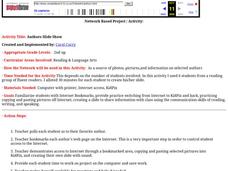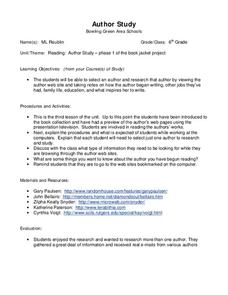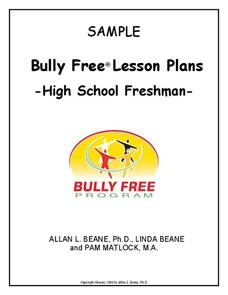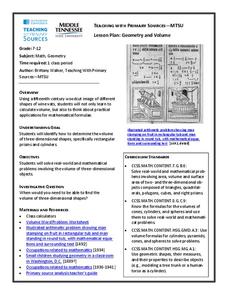Curated OER
Famous Authors Crossword Puzzle
Learners complete a crossword puzzle using previously studied vocabulary associated with literature. Although an answer key is provided, no word list is included.
Curated OER
Famous Authors Find the Definition Worksheet
Consider using this instructional activity as a group work exercise early in a novel study unit. Learners must identify the meaning of words associated with narrative literature. An answer key is provided.
Curated OER
Authors on the Internet
Fifth graders write a list of their favorite authors and illustrators before deciding on ways to learn more about them. They examine print and Internet resources as a way to answer questions they have. They complete an Author Scavenger...
Curated OER
Authors Slide Show
Students conduct Internet research about an author. They complete a title slide for that author which includes a picture of the author and a recording of the student's voice introducing the slide. All slides then be compiled into a class...
Alabama Department of Archives and History
W.E.B. DuBois, Booker T. Washington, and Jim Crow
Class members use the think-pair-share strategy to compare the views of W.E.B. Du Bois and Booker T. Washington and to consider how each man's backgrounds influenced his philosophy.
Curated OER
Twain's Hannibal
Young scholars use primary resources to examine the context the writings of Mark Twain. They criticize the resources for reliability, accuracy, perspective, relevancy, and authoritativeness.
Curated OER
Researching Alternative Energy
Sixth graders investigate the concept of energy using a hypothetical story. The power goes out in their house and they no longer can play your videogames. Students must create your own alternative power source. This story sets the stage...
Curated OER
Author Study
Sixth graders complete a research paper on an author of their choice. After selecting an author of interest, 6th graders use internet and traditional resources to gather information from at various sources. They use their information to...
Curated OER
Comparing Primary Sources from the Industrial Revolution
Tenth graders, in teams, analyze, evaluate and describe primary sources pertaining to industrialization at the turn of the century. They examine the sources and answer questions about each.
Bully Free Systems
Bully Free Lesson Plans—Ninth Grade
"Bullying and Prejudice" and "Do You Cyber Bully," two lessons from a complete Bully Free program, serve as samples of the approach used in a unit designed to bring awareness to and to combat bullying. Each instructional activity asks...
Curated OER
Prejudice and Discrimination
How do we break the habit of prejudice? The activities in this packet are designed to promote awareness, harmony, and acceptance. Participants identify their stereotypic beliefs, attitudes, and behaviors, reflect to discover the sources...
American Evolution
Virginia Runaway Slave Ads
What does an ad reveal about a culture, or about the values of its intended audience? Class members examine a series of runaway slave ads—one of which was written by Thomas Jefferson—and consider what these primary source documents...
National History Day
Challenging the Status Quo: Women in the World War I Military
Why are some so resistant to change? The status quo is often to blame for a lack of forward movement in society. Following the events of World War I, women in America suddenly had a voice—and were going to use it. Scholars use the second...
Virginia Department of Education
Geometry and Volume
The history of math is fascinating! Utilize a woodcut primary source image from 1492 and posters from the 1930s to help geometers apply their volume-calculation skills to real-life questions.
National Endowment for the Humanities
The Victor's Virtue: A Cultural History of Sport
Pupils explore the meaning of the ancient Greek word aretê and the place of virtue in historical athletic competition and modern sports. They begin by reading an informational text on the goal of sports in education, and then evaluate...
Alabama Department of Archives and History
Alabama's 1901 Constitution: What Was at Stake?
Who should be able to vote? As part of a study of the 1901 Alabama Constitution, class members examine primary source document that reveal the reasons the authors gave to support their positions on this question and their assumptions in...
Alabama Department of Archives and History
Conflict in Alabama in the 1830s: Native Americans, Settlers, and Government
To better understand the Indian Removal Act of 1830, class members examine primary source documents including letters written by Alabama governors and the Cherokee chiefs. The lesson plan is part of a unit on the expansion of the United...
Smithsonian Institution
Barn Again! Celebrating an American Icon
How do barns serve as a window to a community's past? Here are a series of lessons on the symbolism and historical context of barns throughout American history. Topics include community-building, in-depth primary and secondary source...
Alabama Department of Archives and History
What Were They Thinking? Why Some Some Alabamians Opposed the 19th Amendment
To better understand the debate over the 19th Amendment, class members examine two primary source documents that reveal some of the social, economic, racial, and political realities of the time period.
Alabama Department of Archives and History
Alabama's Secession in 1861: Embraced with Joy and Great Confidence. Why?
From December 20, 1860 to June 8, 1861, eleven states seceded from the Union. Alabama seceded on January 11, 1861. Why did so many white Alabamians want to secede? Why did they believe the South could win the war? These are the essential...
Conserve Wildlife Foundation of New Jersey
The Great Peregrine Scavenger Hunt - On the Internet
The story of one bird provides valuable insight into general animal behaviors and interactions. Young researchers investigate the peregrine falcon using a web search. They analyze the behaviors of the raptor including its migration...
Turabian Teacher Collaborative
Parts of Argument II: Article Critique
Break down the parts of argumentative writing with a critical thinking activity. High schoolers read an article of your (or their choice), and use a graphic organizer to delineate the ways the author structures his or her arguments.
Curated OER
A Plump and Perky Turkey
Help readers recognize elements in a story. They will use pictures and text to gain meaning from written material. Have learners listen to the story A Plump and Perky Turkey and participate in a discussion. They recognize the Internet...
Curated OER
Thinking About Hate
This lesson starts out with a guided discussion about the statement "Birds fly in the sky; airplanes fly in the sky; therefore, airplanes are birds" and goes on to cover logical fallacies and reliable sources, relating these to the topic...

























